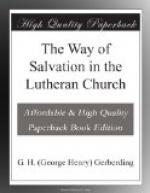In the chapters on the Baptismal Covenant and Conversion, we showed that it is possible to keep that covenant and thus always grow in Grace and in the knowledge of our Lord Jesus Christ. While we sorrowfully admitted that the cases of such as do it are not as numerous as is possible and most desirable, we also learned that they might be far more numerous, if parents and teachers understood their responsibility and did their duty to the baptized children. We verily believe that thus it might become the rule, instead of the exception, that the children of Christian parents would grow up as Christ’s lambs from baptism, would love Him with their earliest love and never wander into the ways of sin. We also firmly believe that those thus early consecrated, trained, taught and nurtured in faith and love, make the healthiest, the strongest and most reliable members and workers in the Church.
Neither can we for a moment doubt but that such is the good and gracious will of Him who desires the little children to be baptized into Him. It certainly seems repugnant to all that we have ever learned of our God and Saviour, that it should be His will that our dear children, who have been conceived and born in sin, and are therefore by nature, or by birth, the children of wrath, should remain in this state of sin and condemnation until they are old enough to be converted at a revival. Yet it must be either that, or a denial of the Bible doctrine of original sin, if we accept the teachings and practices of modern revivalism. For either of these positions we are not prepared.
Therefore it is our great aim and object to recall the Church to the old paths. Therefore we are concerned to see the Church firmly established on the old foundations of the doctrine of original sin, of baptism for the remission of sins, of training up in that baptismal covenant by the constant, diligent and persevering teaching of God’s Word, in the family, in the Sunday-school, in the catechetical class and from the pulpit. In proportion as this is accomplished, in that proportion will we preclude the necessity of conversions and, consequently, of revivals.
Who will say, that a congregation made up of such as are “sanctified from the womb,” “lent to the Lord,” from birth, having “known the Holy Scripture” from childhood, would not be a healthy, living Church? Such a Church would need no revival.
Would it be possible to have such a Church? Is it possible for any one member to grow up and remain a child of God? If possible for one, why not for a whole congregation? Are the means of Grace inadequate? No, no! The whole trouble lies in the neglect or abuse of the means. With their proper use, the whole aspect of religious life might be different from what it is. It is not a fatal necessity that one, or more, or all the members of a church must periodically grow cold, lose their first love, and backslide from their God. It is not God’s will, but their fault, that it should be so.




